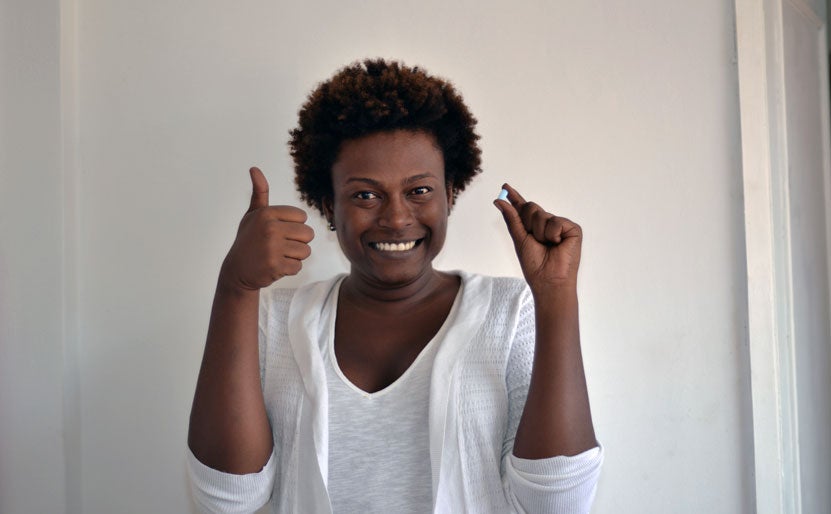
3 January 2018 - Brazil's Ministry of Health began distributing pre-exposure prophylaxis (PrEP) for HIV prevention in key higher-risk population groups through 35 sites across the country.
The Ministry has estimated that in the first year, 9 000 men who have sex with men (MSM), sex workers and transgender people will be offered PrEP through Sistema Único de Saúde (SUS), Brazil's national health service. In launching the programme, the Ministry is working with networks of MSM and transgender people to develop videos and messages to reach people who can benefit from PrEP, including those living in favelas.
As with many other countries in Latin America and the Caribbean region, Brazil's HIV epidemic is focused among MSM and transgender women. In responding to HIV, Brazil has long been recognized for its innovative response to the HIV epidemic.
"PrEP will help to keep Brazil and our region in line with the world's most advanced global responses to HIV - and we feel confident that it will have a positive impact on reducing new infections," said Dr Adele Benzaken, Director of the Department of STI, HIV/AIDS and Viral Hepatitis within Brazil's Ministry of Health.
The Brazilian programme aims to offer PrEP to 54 000 people within the next 5 years. Although the oral antiretroviral formulation will be initially the originator product during the first year, generic medicines may potentially become available, as they could be less expensive.

Where political will and civil society matter
There is strong scientific evidence that PrEP works. Several clinical trials among various populations, including men who have sex with men, and heterosexual men and women, have shown that PrEP is highly effective in reducing the risk of HIV acquisition. Based on this evidence, in December 2015, WHO recommended oral PrEP for any person at substantial risk of HIV.
Last December, a new report on HIV Prevention from the Pan American Health Organization (PAHO) and UNAIDS recommended expanding access to all HIV prevention options that are now available, including PrEP, to reduce the number of new cases of HIV in Latin America and the Caribbean, which since 2010 has remained at 120,000 every year.
Implementing a new biomedical intervention, considered controversial by some, usually requires political will on the part of governments. PrEP is one such intervention, including concern about costs required to deliver it within a public health system. These costs are not only related to the medicine itself, but also to the additional monitoring and staff required to provide PrEP safely and effectively.
Brazil's Ministry of Health is taking a bold and constructive step. The national conversation about offering PrEP at scale started in 2013, when the Ministry funded 5 separate PrEP demonstration projects to better understand the operational challenges in service delivery.
According to Tatianna M de Alencar from the Ministry of Health, these projects have been critical in helping create understanding and demand amongst individuals and populations that can benefit from PrEP.
"As observed in many other settings - including countries such as Australia, France, Thailand and the UK - civil society organizations have served as a catalyst in moving the PrEP agenda forward. That said, we know there are other countries in Latin America and the Caribbean region and beyond where civil society groups have not seen PrEP as a priority."
Planting the seed with iPrEx
Brazil was one of the countries to participate in iPrEx trial- the first study to report that oral PrEP works. São Paulo and Rio de Janeiro served as sites in Brazil for iPrEx.
The main findings of the study were published in December 2010 in the New England Journal of Medicine, which supported the decision by the United States Food and Drug Administration to approve the use of oral PrEP.
Following the experience and building up the expertise, Brazil gradually started to consider PrEP with discussions among health professionals and academics across the country. More health care workers were trained in delivering PrEP.
More active discussion by stakeholders in the country followed, and then PrEP demonstration projects were initiated in other cities. MSM and transgender women have been the focus populations in the eight cities where the Brazilian demonstration projects have been implemented (Rio de Janeiro, São Paulo, Ribeirão Preto, Curitiba, Fortaleza, Porto Alegre, Manaus, Salvador).
Over the past two years, a series of meetings have taken place, which led to the decision to include PrEP within SUS.
First, in 2016, a special committee of scientific experts was established to develop guidelines for PrEP. Second, key stakeholders from civil society were invited to discuss the PrEP national implementation plan and give input on materials relevant to people who might want to take PrEP. Thirdly, municipalities and states were brought together to discuss local strategies to implement PrEP across the country.
The consensus reached to adopt a "phase-in" approach, with 11 states to serve as early adopters, given their pre-existing knowledge of PrEP. By next year, the plan is to have at least one PrEP service in each of the 27 states in Brazil.
IMPrEP: the latest PrEP implementation project
IMPrEP is the latest PrEP project in Brazil, Mexico and Peru. Funded by UNITAID and coordinated by Oswaldo Cruz Foundation (FIOCRUZ), the project will enrol 7,500 MSM and transgender women across the three countries. In Brazil, it will complement implementation of PrEP under the national programme. Both IMPrEP and the national PrEP roll-out under SUS have been working together to harmonize their work and support capacity-building across the country. The project will yield data that can help shape global policy on HIV prevention and show the effectiveness and economic benefits of PrEP. The three countries are expected to save 20 USD million a year between them in HIV treatment costs.
Which projects in Brazil have offered PrEP so far?
- PrEP Brazil - FIOCRUZ (Rio de Janeiro, São Paulo, Manaus e Porto Alegre)
- Combina Project - with University of São Paulo (cities of São Paulo, Curitiba, Ribeirão Preto, Fortaleza and Porto Alegre) - doing PEP and PrEP, ongoing
- Project PREPARADAS - FIOCRUZ: focusing on transgender women (Rio de Janeiro)
- Horizon Project - Federal University of Minas Gerais (city of Belo Horizonte) - 3TC/FTC Phase I
- Transgender Women Project Federal University of Bahia - (city of Salvador): focusing on acceptability of PrEP



